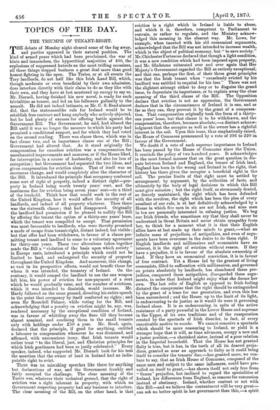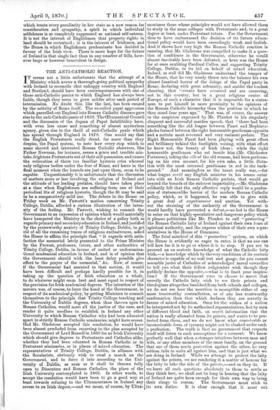TOPICS OF THE DAY
THE TRIUMPH OF TENANT-RIGHT. THE debate of Monday night cleared some of the fog away, and parties appeared in their natural position. The kind of armed peace which had been proclaimed, the war of hints and innuendoes, the hypocritical majorities of 400, the explosions of suppressed hatreds on the most trifling occasions, all these things stopped business a great deal more than good honest fighting in the open. The Tories, or at all events the Tory landlords, do not half like this Irish Land Bill, which, though moderate or even beneficial by their own admission, does interfere directly with their claim to do as they like with their own, and they have at last mustered up energy to say so. Mr. Disraeli, having finished his new novel, is ready for such trivialities as tenure, and led on his followers gallantly to the assault. He did not indeed intimate, as Mr. C. S. Read almost did, that the statesmanlike rule for Ireland would be to establish free contract and hang anybody who actively objected, but he had plenty of excuses for offering battle against the Government Bill. The Government, he said, had altered the Bill until it was no longer the measure to which his party had promised a conditional support, and for which they had voted on the second reading. There was clause three, which was in fact clause two, and in importance clause one of the Bill; Government had altered that. As it stood originally the compensation for causeless eviction was a compensation for unexhausted improvements and manures, or if the House liked, for interruption in a course of husbandry, and also for loss of occupation ; but Government had separated the two ideas, and given compensation for eviction alone. That of itself was an enormous change, and would completely alter the character of the Bill. It introduced the principle that occupancy conferred some sort of right of property, indeed a distinct right—pro- perty in Ireland being worth twenty years' rent, and the maximum fine for eviction being seven years' rent—to a third of the freehold. Think how that would work in the rest of the United Kingdom, how it would affect the security of all landlords, and indeed of all property whatever. Then there was the sixteenth clause ; that had disappeared. Originally the landlord had permission if he pleased to nullify the Bill by offering the tenant the option of a thirty-one years' lease, which the tenant was compelled to accept. That permission was most favourable to landlords, who were thereby promised a mode of escape from tenant-right, distant indeed, but visible ; but that offer had been withdrawn, in favour of a clause per- mitting tenant and landlord to come to a voluntary agreement for thirty-one years. Those two alterations taken together made the Bill a "violation of the basis upon which society" in Europe rests, introduced a principle which could not be limited to land, and endangered the security of property throughout the United Kingdom. And moreover, this change, so vast in its prospective effects, would not benefit those for whom it was intended, the tenantry of Ireland. On the contrary, it would compel the landlord to use the one weapon left him, his power of eviction for non-payment of a rent which he would gradually raise, and the number of evictions, which it was intended to diminish, would increase. Mr. Hardy followed on the same ground, directing his entire speech to the point that occupancy by itself conferred no rights ; and even Sir Bounden Palmer, while voting for the Bill, and acknowledging that a penalty on eviction might be, nay, was, rendered necessary by the exceptional condition of Ireland, was in favour of whittling away the fines till they became almost nominal, and confining them to the small tenants only with holdings under £50 a year. Mr. Read, again, declared that the principle, if good for anything, entitled a labourer to compensation whenever he was dismissed, and affirmed, with unconscious irony, that Irish tenants would rather trust "to the liberal, just, and Christian principles for which Irish gentlemen had been so justly celebrated." Every speaker, indeed, who supported Mr. Disraeli took for his text the assertion that the owner of land in Ireland had an indis- putable right to evict.
There was no mistaking speeches like these for anything but declarations of war, and the Government frankly and fairly accepted the challenge. The clear meaning of the Tones was, whatever their technical ground, that the right of eviction was a right inherent in property, with which no Government respecting property had any business to interfere. The clear meaning of the Bill, on the other hand, is that eviction is a right which in Ireland is liable to abuse, and which it is, therefore, competent to Parliament to restrain, or rather to regulate, and the Ministry acknow- ledged this meaning in the clearest way. Mr. Lowe, for example, when taunted with his old economical arguments, acknowledged that the Bill was not intended to increase wealth, which is the object of political economy, but " to save society." Mr. Chichester Fortescue declared that though a light condition, it was a new condition which had been imposed upon property, and Mr. Gladstone reiterated over and over again that Her Majesty's Government regarded the Bill as entirely exceptional, and that one, perhaps the first, of their three great principles was that the Irish tenant when "causelessly evicted by his. landlord was entitled to requital for his loss." There was not the slightest attempt either to deny or to disguise the grand issue, to depreciate its importance, or to explain away the clear meaning of the third clause of the Bill. The Opposition declare that eviction is not an oppression, the Government declare that in the circumstances of Ireland it is one, and as far as they can, they prevent it by the grant of a compensa- tion. That compensation originally took the form of a thirty- one years' lease, but that clause is to be withdrawn, and the compensation, therefore, becomes absolute,—a distinct acknow- ledgment that the occupier as well as the owner has a rightful interest in the soil. Upon this issue, thus emphatically raised, the House of Commons pronounced by a vote of 296 to 220 in favour of the Government.
We doubt if a vote of such supreme importance to Ireland has been passed by the House of Commons since the Union.. It rescinds the policy of two hundred years. It acknowledges. in the most formal manner that on the great question in dis- pute between Ireland and England, the tenure of Irish land, England has been in the wrong and Ireland in the right, that history has there given the occupier a beneficial right in the soil. The precise limits of that right must be settled by arrangement, by argument, by the collection of facts, and ultimately by the body of legal decisions to which this Bill must give occasion ; but the right itself, so strenuously denied, so fiercely maintained, the right which has been defended with the revolver, the right which has been the plea of every assailant of our rule, is at last definitively acknowledged by a House in which five men in six are not Irish, and nine men in ten are personally interested in refusing justice. We beg our Irish friends, who sometimes cry that they shall never be understood in Great Britain and never obtain sympathy from her, to think for a moment what it is that their English allies have at last made up their minds to grant,—what an infinite mass of prejudices, of antipathies, and even of argu- ments have been overcome in the desire to do them right. If English landlords and millionaires and economists have an interest, it is the right of eviction without reason. If they have a prejudice, it is in favour of the absolute ownership of land. If they have an economical conviction, it is in favour of free contract. Yet a House led by the greatest of living economists, filled to suffocation with millionaires, and governed on points absolutely by landlords, has abandoned these pre- judices, conquered these antipathies, disregarded these argu- ments, in order that Ireland might enjoy what she deems her own. The last relic of English as opposed to Irish feeling dictated the compromise that the right should be extinguished by the grant of a lease for one generation, and even this has. been surrendered ; and the House, up to the limit of its light, is endeavouring to do justice as it would do were it governing Ireland alone. It is so endeavouring, in spite of the active resistance of a party powerful in the Lower House and supreme in the Upper, of its own traditions and of the exasperation created by the spectacle of Irish disorder, in fact, of every conceivable motive to recede. We cannot conceive a spectacle which should be more reassuring to Ireland, or yield it a stronger hope that it will, as time advances, occupy a new and a juster position,—a cherished sister, instead of a poor relation in the Imperial household. That the House has not granted fixity is true, but it has, in the teeth of all its dearest preju- dices, granted as near an approach to fixity as it could bring itself to consider the tenants' due,—has granted more, we ven- ture to say, that an Irish House of Commons, composed of the same men and subject to the same influences, could have pre- vailed on itself to grant,—has shown itself not only free from "Saxon" prejudice, but inclined to regard the specialities of Ireland, her differences from England, as reasons for concession instead of obstinacy. Ireland, whether content or not with this Bill—and we believe the contentment will be very great— can ask no better spirit in her government than this,—a spirit which treats every peculiarity in her state as a new reason for consideration and sympathy, a spirit in which individual selfishness is as completely suppressed as national self-esteem. It is not the interest of Englishmen that property rights in land should be restrained ; it is the interest of Irishmen, and the House in which Englishmen predominate has decided in favour of the Irish view. There is more hope for the future of Ireland in that single fact than in any number of bills, how- ever large or however benevolent in design.



































 Previous page
Previous page